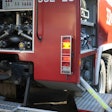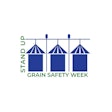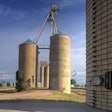
Greg Rowe, vice president of operations, safety, health, and environment at Perdue AgriBusiness and chairman of National Grain and Feed Association’s Safety, Health, and Environmental Quality Committee, says out-of-condition grain is often a leading factor in grain entrapment situations, according to a report at Successful Farming.
Rowe was part of a webinar on Tuesday produced by a number of industry associations and grain-handling equipment businesses and OSHA to recognize Stand-Up for Engulfment Prevention Week April 9-13. During the webinar, Rowe explained grain is much more prone to crusting and cliffing when it is stored at the wrong moisture level or without proper aeration. Taking the proper steps to store grain long term can go a long way in preventing potentially hazardous situations.
It's important to note ground piles may also be prone to cliffing. Materials like woodchips and silage can easily form this dangerous shape.
Rowe explained that confined space entrapment often happens because of one of three situations.
- Sometimes clumps of grain may clog unloading equipment. Entrapment accidents often occur when you enter the bin to free the blockage without shutting off the power. Once the debris is free, grain begins moving again quickly, sucking everything in its path toward the flow of grain. If you're in the bin, you may become buried or even caught in the unloading device.
- Entrapment can also occur when you walk out onto bridged grain. This is where a firm crust has formed on the top of the grain. It may appear to be a solid pile, but once it gives way, you can fall.
- Avalanche entrapment situations often occur when you enter the confined space to break apart grain stuck to the wall on one side. Once you start knocking it free, it can land on top of you.
“Don’t make the mistake of thinking you can get out of the way fast enough,” warns Rowe.
Read the full article here.

















